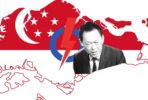What is Groupthink?
Groupthink, a term coined by social psychologist Irving Janis (1972), occurs when a group makes faulty decisions because group pressures lead to a deterioration of “mental efficiency, reality testing, and moral judgment”. Groups affected by groupthink ignore alternatives and tend to take irrational actions that dehumanize other groups. A group is especially vulnerable to groupthink when its members are similar in background, when the group is insulated from outside opinions, and when there are no clear rules for decision making.
Symptoms of Groupthink
1) Illusion of invulnerability – Creates excessive optimism that encourages taking extreme risks.
With 50 years in absolute power, and can amend the constitution at will, the PAP has the illusion of invulnerability. That explains why they can chide the voters to repent if they voted for the alternatives during 2011 election. They also take extreme risks thinking that the voters are daft and would not appreciate transparency. Case in point – Temasek, GIC and $2 company AIM.
2) Collective rationalization – Members discount warnings and do not reconsider their assumptions.
Many times warning signs highlighted in parliament by the alternatives were brushed aside. As long as the ideas were not from their (PAP) own members, it will be quickly shot down only for the citizens to bear the consequences later. Case in point – The riot at Little India, SBS Bus drivers’ strike.
3) Belief in inherent morality – Members believes in the rightness of their cause and therefore ignores the ethical or moral consequences of their decisions
We can see this symptom when the PAP makes the argument that the public is better off not knowing the value of our reserves or where all the tax-payers monies go to. Case in point – The Casino project and YOG. They believe that their cause is a righteous one, ignoring the ethical or moral consequences of their actions.
4) Stereotyped views of out-groups – Negative views of “enemy” make effective responses to conflict seem unnecessary.
PAP thinks that the alternatives are out to destroy Singapore and our neighbouring countries are out to invade Singapore. This is unnecessary and usually, small conflicts were always blown out of proportion due to the fact that the PAP’s negative views of the ‘enemy’.
5) Direct pressure on dissenters – Members are under pressure not to express arguments against any of the group’s views.
Party whip is often applied to get members to acquiesce. Disciplinary actions will be taken against those who don’t comply. Case in point – Population 6.9 million white paper. All PAP members voted yes and those who strongly disagree had to be absent in order not to ruffle any feathers.
6) Self-censorship – Doubts and deviations from the perceived group consensus are not expressed.
The above is self-explanatory. Ministers will cry mother and father but at the end of it, they will say that in the best interest of the nation, they agree to whatever was being proposed. Case in point – Minister Lim Boon Heng tears on the building of the casino.
7) Illusion of unanimity – The majority view and judgments are assumed to be unanimous.
Because dissenting voices within the group are curbed, they discounted the fact that many hold their peace because they want to get in the good books of the little emperor LHL.
8) Self-appointed ‘mindguards’ – Members protect the group and the leader from information that is problematic or contradictory to the group’s cohesiveness, view, and/or decisions.
This scenario was clearly seen as recently in the Punggol East By-Election. It was reported that the PAP grassroot had informed of the ground sentiments shifting and also PAP members were not happy by the decision to parachute an elitist candidate who did not do prior grassroot activities but was still chosen as a candidate. This information did not reach the top management. Somewhere, somehow within the hierarchy, someone see it fit not to report the problematic truth.
Groupthink occurs when groups are highly cohesive and when they are under considerable pressure to make a quality decision. Members are less motivated to realistically appraise the alternative courses of action available to them.
These group pressures lead to carelessness and irrational thinking since groups experiencing groupthink fail to consider all alternatives and seek to maintain unanimity. Decisions shaped by groupthink have low probability of achieving successful outcomes.
Thus, Singapore will sink further with the incumbent in power unless a radical change happens within PAP itself.
Regards,
YOUTUBE: youtube.com/user/rilek1corner
FACEBOOK: facebook.com/rilek1corner
TWITTER: twitter.com/Rilek1Corner
WEBSITE: rilek1corner.com
EMAIL: [email protected]
FEEDBACK: CONTACT RILEK1CORNER










